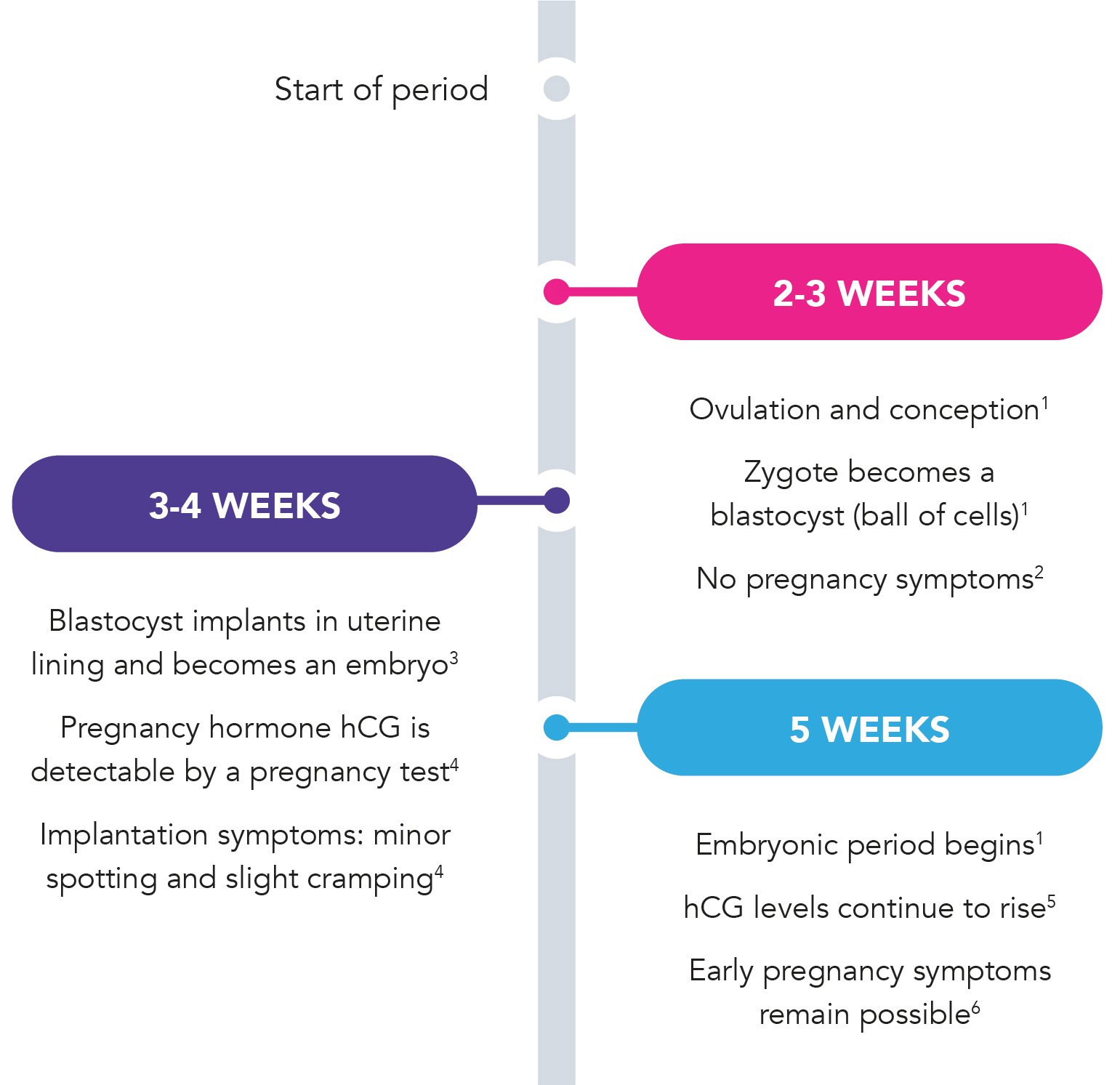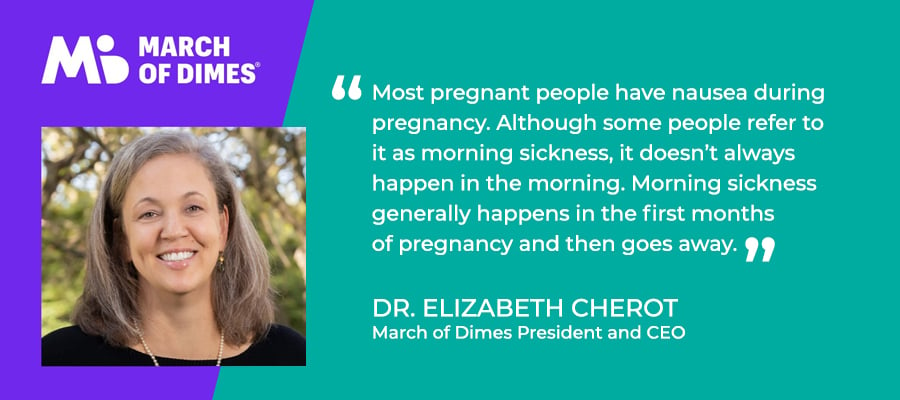Early pregnancy symptoms and signs: What to expect in the first weeks

Your pregnancy test is positive. You’ve made an appointment with your healthcare professional. And in the meantime, you have many questions: What’s happening inside of me right now? What early pregnancy signs and symptoms should I expect and when will they start? Is what I’m experiencing normal? Whether you’re overjoyed with the knowledge that you’re pregnant or you’re filled with anxiety (or both!), not knowing what is happening or what to expect can feel overwhelming. Here, we share what’s occurred since your last menstrual cycle (spoiler alert: It’s a lot!) and what you can expect through the first few weeks of your pregnancy.
Early pregnancy week by week: a timeline of what to expect

2 to 3 weeks: What to expect
(Healthcare professionals refer to this as 2-3 weeks, which is the amount of time that has passed since your last menstrual period. Pinpointing exactly when you conceived can be difficult.)
- Ovulation and conception1
- Zygote (the cell formed after the egg is fertilized by sperm) becomes a blastocyst (ball of cells)1
- No pregnancy symptoms2
3 to 4 weeks pregnant: Symptoms and signs — what to expect
(Healthcare professionals refer to this as 3-4 weeks, which is the amount of time that has passed since your last menstrual period.)
- Blastocyst implants in uterine lining and becomes an embryo3
- Pregnancy hormone hCG (human Chorionic Gonadotropin) is detectable by a pregnancy test4
- Implantation symptoms: minor spotting, slight cramping or nothing at all4
5 weeks pregnant: Symptoms and signs — what to expect
(Healthcare professionals refer to this as five weeks pregnant, which is the amount of time that has passed since your last menstrual period.)
- Embryonic period begins, which is when the embryo grows and the tissues begin to differentiate into organs1
- hCG levels continue to rise5
- Early pregnancy symptoms remain possible, including fatigue, breast tenderness and mild cramping6
The first four weeks of pregnancy
Many people say that pregnancy lasts about 40 weeks. However, during the first two weeks of how healthcare professionals date your pregnancy, you’re actually not pregnant — yet (while this may sound confusing, bear with us).1 Week one of the pregnancy timeline starts on the first day of your last menstrual period.1 This means that at two weeks into the timeline, if you haven’t ovulated yet, you’re definitely not pregnant.1 Rather, your body is preparing for the chance of pregnancy.2
Ovulation, which is when a mature egg is released from an ovary, typically happens 12 to 16 days before your next period.7 Fertilization may occur if the egg meets a sperm in the fallopian tube.1 The egg and sperm combine to form a zygote.1 The zygote then moves through the fallopian tube while dividing and multiplying, becoming a blastocyst (a ball of cells).1 Around three weeks into pregnancy, the blastocyst implants in the lining of the uterus, which is thick with tissue with a good blood supply in case implantation occurs.1 If it does, that blood supplies vital nourishment to what is now called the embryo.1
Cramping in early pregnancy and other first trimester pregnancy symptoms
Mild cramping and light spotting can sometimes occur during implantation.4 You might confuse this cramping and spotting with the start of your period. But once implantation occurs, the embryo will begin producing the pregnancy hormone hCG.4 This hormone has several important tasks, including telling your body to produce more estrogen and progesterone to keep your uterine lining thick.5 This also prevents menstruation and the start of a new cycle.5 A missed period can be one of the first signs of pregnancy.6
But even before you miss your period, some pregnancy tests can confirm the pregnancy. The Clearblue® Early Detection Pregnancy Test provides early detection of the pregnancy hormone, so you can test 6 days sooner than your missed period.8
You can also thank a combination of increasing hormones for early pregnancy symptoms and signs, which may include:
- Fatigue
- Tender, more sensitive breasts that may grow larger
- Nausea and/or vomiting
- Mood swings
- Constipation and/or an increased need to urinate
- Food cravings or aversions
- A heightened sense of smell
- Headaches
- Heartburn
- Bloating6

“Most pregnant people have nausea during pregnancy. Although some people refer to it as morning sickness, it doesn’t always happen in the morning. Morning sickness generally happens in the first months of pregnancy and then goes away.”
— Dr. Elizabeth Cherot, President and CEO, March of Dimes
You may be experiencing some of these early pregnancy symptoms, but don’t worry if you’re not. Some women are overcome with fatigue and/or nausea throughout their first trimester, while others experience few pregnancy symptoms. Both experiences are normal.9
The fifth week of pregnancy
By the time you’re five weeks pregnant, you’ve likely had a positive pregnancy test or you’ve realized you need to take a home pregnancy test due to a missed period. You may also have early pregnancy signs and symptoms. After having a positive pregnancy test, it’s important to make an appointment with your healthcare professional so you can receive proper guidance, instruction and monitoring. No one has to know you’re pregnant except you and your healthcare professional; most people don’t start showing until the second trimester, which begins at 12 weeks.
At five weeks pregnant, although the embryo is only about the size of a sesame seed, big changes are happening.6 This is when the embryonic period starts.1 According to The American College of Obstetricians and Gynecologists, between weeks five and eight of pregnancy, the brain and spine start forming, cardiac tissue develops, sections of the face start to take shape, the inner ear develops, and arm and leg buds form, followed by the emergence of webbed toes and fingers.10 The digestive tract also appears as a long tube, all in an embryo only about a half-inch long.10
Wondering what comes next? Your healthcare professional can give you additional information on what to expect during the remainder of your pregnancy. It’s an exciting time!
Related Articles
Sources & Disclaimers
- National Library of Medicine, MedlinePlus. Fetal development. Updated August 23, 2023. Accessed January 19, 2024. https://medlineplus.gov/ency/article/002398.htm
- Nemours, KidsHealth. Week 2. Accessed January 19, 2024. https://kidshealth.org/en/parents/week2.html
- Nemours, KidsHealth. Week 3. Accessed January 19, 2024. https://kidshealth.org/en/parents/week3.html
- Nemours, KidsHealth. Week 4. Accessed January 19, 2024. https://kidshealth.org/en/parents/week4.html
- Cleveland Clinic. Human chorionic gonadotropin. Updated March 11, 2022. Accessed January 19, 2024. https://my.clevelandclinic.org/health/articles/22489-human-chorionic-gonadotropin
- National Health Service. Week-by-week guide to pregnancy. Accessed January 19, 2024. https://www.nhs.uk/start-for-life/pregnancy/week-by-week-guide-to-pregnancy/1st-trimester/week-5/
- National Health Service. How can I tell when I’m ovulating? Updated November 4, 2022. Accessed January 19, 2024. https://www.nhs.uk/common-health-questions/sexual-health/how-can-i-tell-when-i-am-ovulating/
- 77% of pregnancies can be detected 6 days before the missed period (5 days before the expected period)
- Office on Women’s Health, U.S. Department of Health & Human Services. Stages of pregnancy. Updated February 22, 2021. Accessed January 19, 2024. https://www.womenshealth.gov/pregnancy/youre-pregnant-now-what/stages-pregnancy
- The American College of Obstetricians and Gynecologists. Changes during pregnancy. Updated November 2023. Accessed January 19, 2024. https://www.acog.org/womens-health/infographics/changes-during-pregnancy




